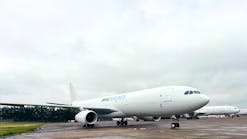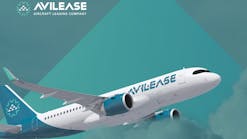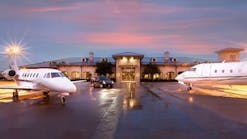Outgoing chairman known for putting employees first
Robert Duncan has a line he likes to deliver in jest, perhaps, but it also shows the awful responsibility an aviation services company carries: "Don't you want your airplane worked on by happy people?"
There is only one right answer to that question.
On his last day as chairman of Duncan Aviation last week, what might have been a sober or even a sad time at the office was openly gleeful as Duncan eased into his new role as chairman emeritus.
His family was there. There was a dinner party to chat about. Duncan's wife, Karen, had a leash on the dog, which was happily nipping pant legs.
Before flying off to the industry's biggest trade show, Duncan's successor as chairman, his son Todd, was there with his wife, Connie, talking and laughing about mistaken identities at a football game in which their twin boys played.
Having fun at work is important at this company, built into routines because it's part of the owners' personalities. They declare it's good business.
The halls of Duncan's headquarters on the east side of the Lincoln Airport have a comforting air of whimsy from the art hanging everywhere. Robert Duncan and his wife are renowned patrons.
Creativity is a big part of the company's business and work ethic, too.
"People love to come to work here," Robert Duncan said. "The customers comment on it regularly. We hire for attitude. You gotta want this type of environment."
The Duncans and their 1,900-plus employees, 1,250 in Lincoln, have plenty to be happy about.
As Robert Duncan retires, or rather, finishes a years-long transition, the company his father, Donald Duncan, founded 51 years ago is one of the most admired in the aviation industry and the largest remaining that is still family-owned.
Professional Pilot magazine has ranked Duncan best in the nation for avionics and maintenance more often than not for 25 years.
Duncan's prospects could hardly be better, with more businesses choosing private aviation over the stunned, staggering and inefficient commercial airline system.
A new generation of smaller, private business jets is emerging, but the company is debating its role in their future.
Duncan Aviation's revenues, $370 million for 2006, are expected to reach $400 million this year.
They still get offers at least weekly, sometimes daily, to buy the company, but it's clear the nerve center of this most local of big, privately held businesses isn't going anywhere.
"They just want to flip it," Robert says, dismissing the would-be buyers.
Duncan may still go elsewhere, but only by expanding its reach to somewhere in the West or Southwest from its home base of Lincoln and its recently renovated operation in Battle Creek, Mich.
"We certainly are considering it," Robert said. "We've looked at a number of different communities."
It's a $30 million commitment, he said, so they're being conservative, taking their time to make the right decision.
Things haven't always been so great. Robert took over as president in 1968, and when his father died in 1981, economic circumstances and federal investment tax credit policies were forcing the general aviation industry into trouble and moving Duncan out of its aircraft sales focus into service.
Like everyone in the industry, Duncan had to regroup after Sept. 11, 2001.
The company specializes in "depot maintenance," the kind that needs to be done to a business jet every six to eight years, as opposed to more frequent routine maintenance.
But its range of work is vast: from exterior and interior renovation and design, to avionics system modification, installations and repair, government contract support and aircraft acquisition service.
Among its innovations are opening small avionics operations at 20 major airports in America. (Robert Duncan thought of that when he found out a shoe vendor was not actually owned by the store he was in.)
It also has Duncan Aviation Parts Support, an international organization that buys, consigns and sells general aviation parts.
Another achievement is its development of independent avionics and instrument test equipment.
The company describes itself as the most comprehensive aviation support operation in the world.
Most of its customers are high-end business aviators.
Those customers used to be the base of Duncan's triangle, a graphic representation of the three important components of the business, along with employees and the owners.
Now, and for some time, the base of Robert Duncan's triangle is the employees.
"We had it wrong," Robert said in an earlier interview. "If we take good care of the employees, they'll take care of the customers and we'll make money."
Simple, elegant and true, according to the trade press that covers general aviation.
"Yeah, but, yeah, but... many companies run that party line about the importance of employees," reported Vicki P. McConnell, technology editor of Aviation Maintenance magazine, in the August edition's cover story on Duncan Aviation. "The deal is, most companies don't put the level of dollars and cents into employee benefits as Duncan Aviation."
The magazine reported Duncan puts the equivalent of 20 percent of after-tax profits for the overall technical and professional education and development of the employees.
Duncan also has a policy of not laying people off.
"Everybody's got value, everybody's got something to contribute," Robert said. "That's a powerful thing."
Hundreds of employees have gone through leadership training, and Robert says it changes their lives, not just their work.
This is where the wing meets the air, responsibility arrives among happy people whose clients depend on them to keep their aircraft in the air, to stay alive.
"We're working with people's lives every day," Robert said. "Every single employee is responsible for safety. You have to have it. It's inherent in everybody's job.
"If they see something wrong, or a customer not being treated right, it's their responsibility to stop the process."
Among those whose education continues is son and successor Todd Duncan, 20 years with the company.
More than a year ago, he described himself as "vice president of something."
Now he's the chairman. He spent part of the summer living in a dormitory room at the Stanford Executive Program, no family, no car.
Todd said he read more and learned more than he imagined he could in six weeks.
Then, last week, as he succeeded his father, he was off to the annual convention of the National Business Aircraft Association in Atlanta. Last time, Duncan hung a huge umbrella with all its employees' pictures.
The customers loved it, Robert said.
Reach Richard Piersol at 473-7241 or [email protected]





